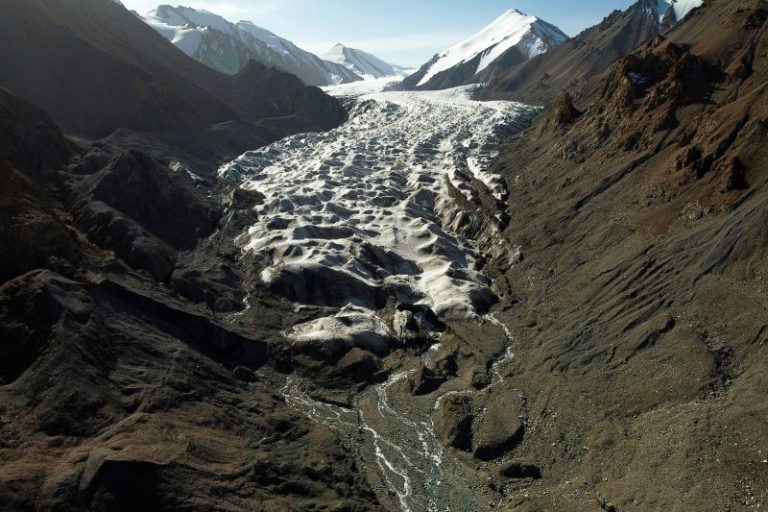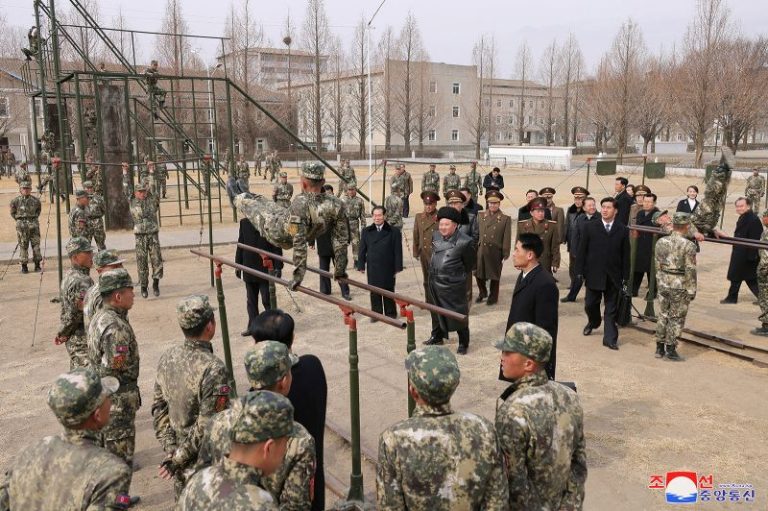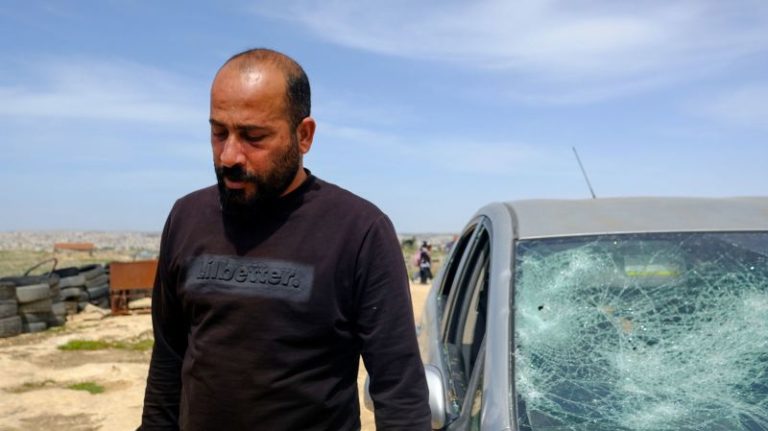In a small village in the Hebron hills of the occupied West Bank, Hamdan Ballal stood outside his house in a track suit with a black eye.
He held the hand of his 18-month-old daughter, who stood in a pool of his dried blood.
Things looked quite different for the award-winning director just weeks ago. He had flown to Los Angeles to accept an Oscar for the film, “No Other Land,” a documentary he co-directed about the violence and forced displacement of Palestinian villagers for illegal Israeli settlements in those same hills.
Ballal was attacked by a mob of Israeli settlers in front of his home, in the village of Susya on Monday evening.
“I thought they would kill me,” he said.
Meanwhile, Ballal said, Israeli soldiers soon arrived outside his home, where they shot live rounds into the air.
He said one soldier pushed his rifle into his leg and told him, “’After (shooting) in the air, I will put the shot in your body.’”
After the attack, Ballal and two other Palestinians were taken away by Israeli soldiers and detained in a military facility in the settlement of Kiryat Arba, where he said he was handcuffed, blindfolded and beaten.
The Israeli military called Ballal’s allegations that he was beaten in custody “baseless.”
Attacks on Palestinian farmers and activists in the occupied West Bank are not new.
However, the ferocity of the attack – and Ballal’s subsequent detention – made him feel that the settlers – and the Israeli military – were taking revenge for their film and its international reach.
“At that moment, I thought because of my Oscar, they wanted to kill me,” he said.
In detention, Ballal, who doesn’t speak Hebrew, said he heard the soldiers laughing when they said his name and the word “Oscar.”
The Israeli military said the Palestinian detainees were given medical treatment and “handcuffed in accordance with operational protocol.”
They accused Ballal of throwing stones at soldiers and said that he had been detained on suspicion of rock hurling, property damage, and endangering regional security.
“They change everything,” Ballal said of the military’s interpretation of the events.
“Why did the settlers come here to my house? To say hi to me? Or to give me flowers? No, they came here to attack, to kill, to push you to leave your home,” he said, adding that many Palestinian villagers eventually leave their homes after years of sustained violence.
“When they have the law in their hand, they can do whatever they want,” Ballal said of the settlers, underscoring what multiple human rights organizations have said about Israel’s role in backing settler violence – and settler impunity.
Amnesty International has called settler violence “part of a decades long state-backed campaign to dispossess, displace and oppress Palestinians in the occupied West Bank, including East Jerusalem, under Israel’s system of apartheid,” and that “Israeli forces have a track record of enabling settler violence.”
Behind his house, Ballal looked to his fields, where a perimeter of settler outposts were visible. He said that his family haven’t farmed much since Israel’s war in Gaza began following Hamas’ October 7, 2023 attacks on Israel.
“We didn’t plow it after October 7 because of the danger from the settlers,” he said.
Settler outposts are often established by Israeli settlers on hilltops with a few caravans and sometimes livestock to mark their claim.
Such land grabs go hand-in-hand with an escalation in violence by Israeli security forces and settlers against Palestinians, paving the way for settlement expansion, which is documented in Ballal’s film.
That violence has become even worse since the re-election of US President Donald Trump, a staunch supporter of Israeli Prime Minister Benjamin Netanyahu and his government’s settlement expansion policy in the West Bank, activists say.
In early January, Trump rescinded Biden-era sanctions on far-right settler groups and individuals accused of involvement in violence against Palestinians in the occupied West Bank. And during his first term, Trump abandoned the long-held position that Israeli settlement expansion in occupied Palestinian territories are illegal, contrary to most international law.
From January 2024 to 2025, at least 1,420 incidents of settler violence in the occupied West Bank were recorded, according to the United Nations Office for the Coordination of Humanitarian Affairs (OCHA). Those incidents include settlers reportedly killing five Palestinians, including a child, and injuring 360 others, including 35 children, according to OCHA.
More than 26,100 Palestinian-owned trees – which are vital to the local economy – were also vandalized in that period, OCHA said.
On Sunday, Netanyahu’s cabinet approved a plan to separate and legalize 13 settlement outposts in the occupied West Bank, a move that his far-right finance minister Bezalel Smotrich hailed as a move toward what he called “actual sovereignty” in the West Bank.
For Ballal, the assault – and Netanyahu’s moves – are even more of a reason to continue to fight for his community.
“I brought myself in this circle (of activism and filmmaking) because of my community, my villages – I need justice for them. Because of that, we made this movie, to bring attention to what’s happening in this area and what is happening there.”
Later in the afternoon, settlers brought their cows and sheep to graze on the farm next to Ballal’s land.
The settlers were accompanied by Israeli soldiers.
Ballal said that no amount of intimidation – from settlers or from the government – will push him from his home.
Standing under the sun, he added: “No other home. No other land.”
This post appeared first on cnn.com



